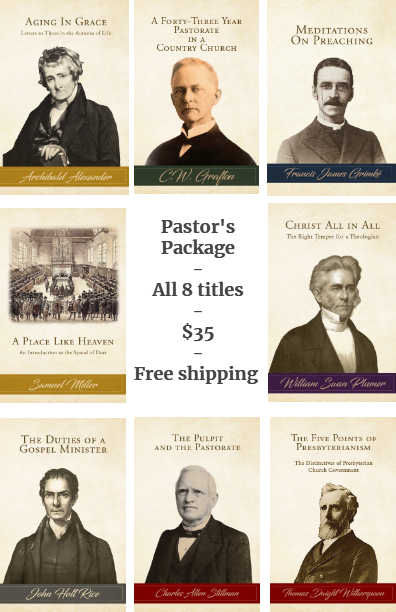Receive our blog posts in your email by filling out the form at the bottom of this page.
Be deeply affected with the corruption of nature in your children. For as no man will value a Savior for himself who is not convinced of the sin and misery which he must be saved from, so you must be sensible of your children’s sins, or else you cannot labor for their salvation. When your sweet babes are born, you rejoice to find that in God’s book all their members are written. But you should be sensible of that body of sin they are born with, and that by nature they are young atheists and infidels, haters of God, blasphemers, whoremongers, liars, thieves, and murderers. For they are naturally inclined to these and all other sins, and are by nature children of the wrath of the infinite God. And being convinced of us, you will find that your chief care of them should be to save them from this dreadful state of sin and misery. — Edward Lawrence, Parents’ Concerns For Their Unsaved Children (1681, 2003), p. 33
This little story may not have a happy ending; not all stories do. Only the Searcher of hearts knows the full story though.
Samuel Davies, the great Presbyterian “Apostle of Virginia” and President of the College of New Jersey (Princeton), who himself — like his Biblical namesake — was a "child of prayer," was married twice. His first wife, Sarah Kirkpatrick, died in childbirth in September 1747, along with their infant son, less than one year after the couple was married. Davies married Jane Holt of Williamsburg in October 1748, and they had a total of six children — three boys who survived to adulthood, two daughters likewise, and one daughter who died in infancy.
On August 20, 1752, John Rodgers Davies, named for a dear friend of Samuel, John Rodgers (1727-1811), entered the world. His father wrote a poem upon the occasion: "On the Birth of John Rodgers Davies, the Author's Third Son."
Thou little wond'rous miniature of man,
Form'd by unerring Wisdom's perfect plan;
Thou little stranger, from eternal night
Emerging into life's immortal light;
Thou heir of worlds unknown, thou candidate
For an important everlasting state,
Where this your embryo shall its pow'rs expand,
Enlarging, rip'ning still, and never stand....
Another birth awaits thee, when the hour
Arrives that lands thee on th'eternal shore;
(And O! 'tis near, with winged haste 'twill come,
Thy cradle rocks toward the neighb'ring tomb;)...
A being now begun, but ne'er to end,
What boding fears a father's heart torment,
Trembling and armons for the grand event,
Lest thy young soul so late by heav'n bestow'd
Forget her father, and forget her God!...
Maker of souls! Avert so dire a doom,
Or snatch her back to native nothing's gloom!
Davies treasured his children as gifts of God for which he and Jane were designated stewards, assigning great worth to their eternal souls, and thus took great pains in his household to lead family worship and to educate his children himself.
"There is nothing," he writes to his friend, "that can wound a parent's heart so deeply, as the thought that he should bring up children to dishonor his God here, and be miserable hereafter. I beg your prayers for mine, and you may expect a return in the same kind." In another letter he says, "We have now three sons and two daughters, whose young minds, as they open, I am endeavoring to cultivate with my own hand, unwilling to trust them to a stranger; and I find the business of education much more difficult than 1 expected. My dear little creatures sob and drop a tear now and then under my instructions, but I am not so happy as to see them under deep and lasting impressions of religion; and this is the greatest grief they afford me. Grace cannot be communicated by natural descent; and if it could, they would receive but little from me." — John Rice Holt, Memoir of the Rev. Samuel Davies (1832), p. 106
One might think that the children of such a humble, godly minister of the gospel as Samuel Davies was known to be might excel in piety themselves. The picture we are given of their trajectories in life is not as inspiring as we would wish, however.
Jane Holt Davies, known to Samuel affectionately as "Chara" (Greek for joy or happiness), is believed to have died in Virginia sometime after 1785.
William (b. August 3, 1749) served in the American army in the War of Independence and rose to the rank of colonel. He was a man of gifted intellect, but of "loose and unsettled" religious opinions.
From this gentleman [Capt. William Craighead] the writer learned that Col. Davies always spoke with high respect of the character and talents of his father; but his own religious opinions seemed to be loose and unsettled. He expressed the opinion that the Presbyterian religion was not well adapted to the mass of mankind, as having too little ceremony and attractiveness; and, on this account, he thought the Romanists possessed a great advantage. He was never connected, so far as is known, with any religious denomination; and, it is probable, did not regularly attend public worship. His death must have occurred before the close of the last century, but in what particular year is not known. He died, however, in the meridian of life.*
Samuel (b. September 28, 1750), who in appearance resembled his father and namesake, was "indolent" in business and ultimately moved to Tennessee where he died in obscurity.
The only child of Samuel Davies who made a public profession of faith was a daughter who lived in the Petersburg, Virginia area.
Concerning John Rodgers Davies, the report we have is not encouraging.
The third son, John R. Davies, was bred a lawyer, and practised law in the counties of Amelia, Dinwiddie, Prince George, &c. He was a man of good talents, and succeeded well in his profession; but he had some singularities of character, which rendered him unpopular. As to religion, there is reason to fear that he was sceptical, as he never attended public worship, and professed never to have read any of his father’s writings. An old lady of the Episcopal church, in Amelia, informed the writer, that he frequented her house, and was sociable, which he was not with many persons. As she had heard his father preach, had derived profit from his ministry, and was fond of his printed sermons, she took the liberty of asking Mr. Davies whether he had ever read these writings. He answered that he had not. At another time she told him that she had one request to make, with which he must not refuse compliance. He promised that he would be ready to perform any thing within his power to oblige her. Her request was that he would seriously peruse the poem which his father wrote on the occasion of his birth. “Madam,” said he, “you have imposed on me a hard service.” Whether he ever complied with the request is not known. About the year 1799 the writer was in Sussex county, and in the neighbourhood where this gentleman had a plantation, on which he had recently taken up his residence. Those of the vicinity, who professed any religion, were Methodists; their meetings however he never attended, always giving as a reason that he was a Presbyterian. But now a Presbyterian minister had come into the neighbourhood, and was invited to preach in a private house, almost within sight of Mr. Davies; he was informed of the fact, and was earnestly requested to attend. He declined on one pretext or another; but on being importuned to walk over and hear one of his own ministers, he said, “If my own father was to be the preacher, I would not go.” And again, “If Paul was to preach there, I would not attend.”*
John Rodgers Davies died unmarried in Virginia in 1832. There is no indication in the historical record that he ever embraced the faith of his father.
As Davies said, "Grace cannot be communicated by natural descent." It is undoubtedly a great blessing for children to be raised in a godly home. Although covenant promises give us great reason to hope, there is no guarantee that godly parents will necessarily have godly children. He died in 1761 so the oldest of his children, William, would have been but eleven years old, and the lack of fatherly guidance in their teenage years is factor not to be ignored when taking stock of the childrens’ spiritual state in adulthood. But however the state of affairs may fall out in God’s providence, we must always pray for our children, and never give up hope for them, but trust in God for the salvation of their souls. He alone can give the gift of faith, and that should bring us to our knees as we pray for the good of those souls to which parents are entrusted as stewards.
* Source: A Recovered Tract of President Davies (1837).
















